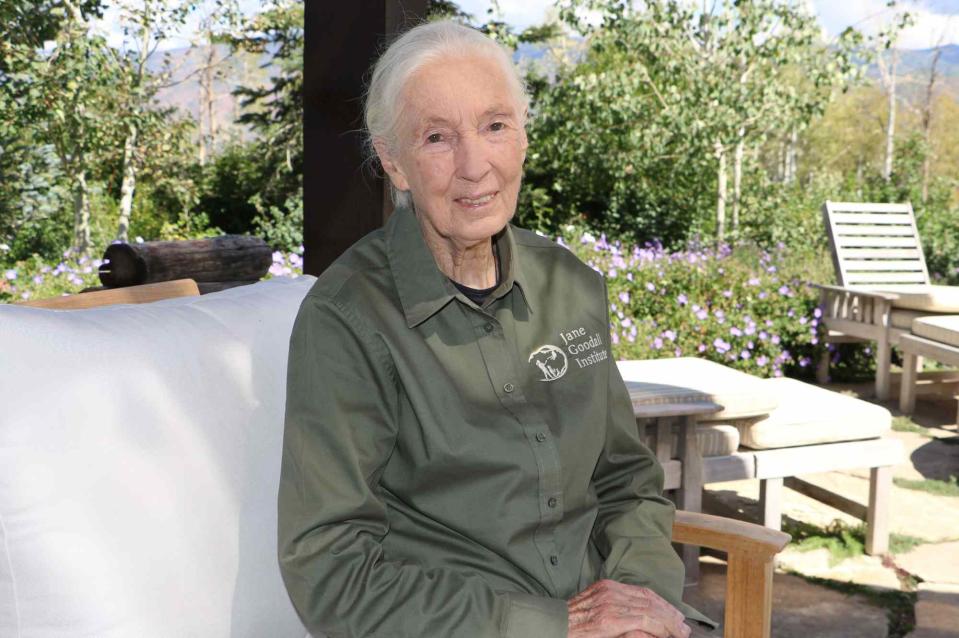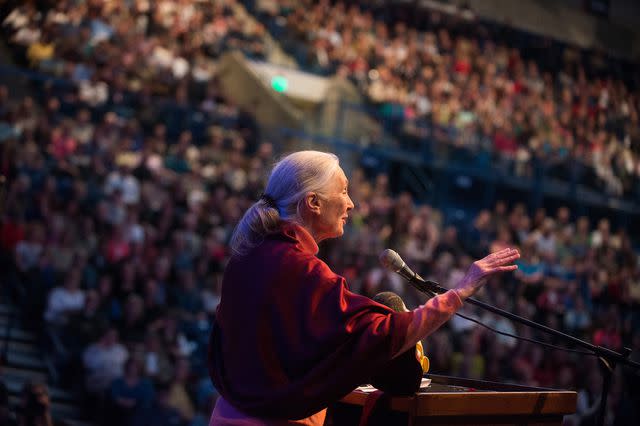Dr. Jane Goodall on Responsible Animal Tourism — and Her Hope for the Future
- Oops!Something went wrong.Please try again later.
"Tourism, well-managed, is very important for various reasons," Dr. Goodall told T+L when speaking about the state of animal tourism.

Amiee White Beazley
When I caught up with 89-year-old Dr. Jane Goodall, she was visiting the Aspen Center for Environmental Studies, in Colorado, where she gave three lectures to local school children on behalf of the Jane Goodall Institute and her youth organization Roots & Shoots. It was early autumn in Colorado and the last hummingbirds of summer dashed from flower to flower before embarking on their fall migration. The animal expert, who admits to not only loving birds, but all living things, was in her element among the wild landscape.
Still traveling more than 300 days per year for in-person events, Dr. Goodall shows no signs of slowing down as she shares her philosophy of hope throughout the world.
Travel + Leisure: I’m interested in your thoughts on the role animal and conservation tourism can play in developing nations, particularly those in Africa. How can tourism benefit local ecosystems and resident wildlife?
Jane Goodall: Well, it's got two sides to it. The main answer is, how is the place tourism managed? That's the absolute key. In many countries, the government finds that people will pay to go and see, for example, mountain gorillas in Rwanda. So the researchers there said, ‘No more than six people at a time, and they can't stay more than an hour.’ Well, the governments there think, ‘Okay, we get all this money for six. Now we'll map it to twelve.’ These areas are getting too many tourists and it’s affecting the animals. That's killing the goose that lays the golden egg.
Is there a solution? Can one be a responsible traveler?
I don't have the solution, and sometimes tourism exploits the animals terribly. But tourism, well-managed, is very important for various reasons. One, it has a major effect on the people on the tour, especially if they have a knowledgeable local guide who knows not only about lions and elephants, but birds and maybe butterflies, so that even if you don't see the big things, you can be entertained. And the benefits the country gets means the national parks get more money, too. There's a lot of employment in the parks and nearby hospitality — at hotels and restaurants — which provides lots and lots of jobs. The local people begin to see a value to the animals.

Rajah Bose/Gonzaga University
Dr. Jane Goodall speaking at Gonzaga UniversityYou’re right. Being in the place and actually seeing the animals in their habitat with your own eyes makes you want to fight to protect it.
There's no question about it. When you look into a chimpanzee’s eyes, a gorilla’s eyes, or an elephant’s, it changes you.
Part of your relentless worldwide schedule is to reassure people that hope for the environment is not lost, and that even individual actions can make a difference.
Individuals can do their part even if it's just not using pesticide on their lawns or supporting places for hummingbirds or bees. It can be that simple. Not eating meat or not eating meat one day a week to start with. Industrialized meat is bad for you, it's horrible for the animals, and it's destroying the environment. So even if everybody on the planet who’s still eating meat stopped eating it for just one day and then two days, it would make a huge difference.
Your lectures lately focus on the idea that there is hope for a better world. I share in your optimism, but sometimes it feels like things get darker and darker. What drives you to keep going?
I wouldn't keep going if I didn't know that going to a place makes a difference. And I only know that because people tell me. I get letters saying ‘I'd given up. But after your lecture, I promise you I'll do my bit.’ Hundreds of young people have written to say joining Roots & Shoots was the best thing [they] ever did. Even in Tanzania, a 12-year-old boy said, ‘Until Roots & Shoots, I didn't know animals had feelings. Now, I'll never hurt another animal as long as I live.’ That's amazing.
Are you still surprised this is the way your life has unfolded? The amazing legacy you’ve been able to create?
The only way I can cope with this craziness is by saying, well, there's two Janes, this one, I'm talking to you, perfectly normal, and then there's the icon that was created by National Geographic and so on. I go through an airport with dark glasses and my hair down, and still people recognized me. So I thought, well, okay, the only thing to do is to make use of it, so I'll use it.
And after, when – if – you finally decide to stop traveling, who will be the next Jane Goodall? Do you think that the next Jane will be one of these children who have heard your message?
I think there'll be a lot of Jane Goodalls springing up. I mean, nobody can be me. I've lived 90 years. You can't expect a child to know all the things that you learn in 90 years. But passion, commitment, dedication, children today have all of these. Some children are doing amazing things. They give me hope that that nature can come back if you give it a chance, even totally destroyed places. And animals on the brink can be given another chance.
For more Travel & Leisure news, make sure to sign up for our newsletter!
Read the original article on Travel & Leisure.

